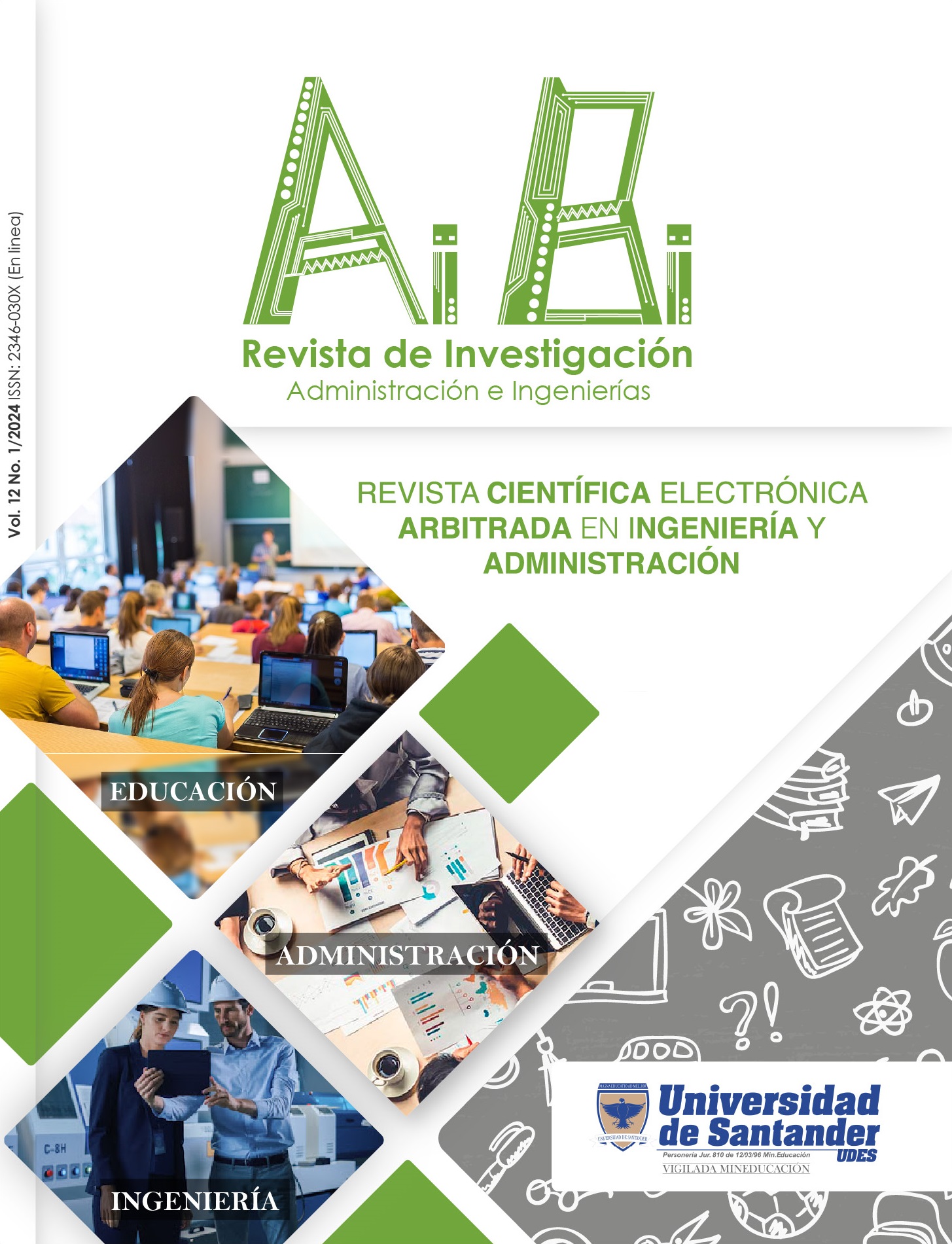Employee indifference towards workplace: An investigation on extended remote working as an antecedent
DOI:
https://doi.org/10.15649/2346030X.3433Palabras clave:
COVID 19, employee indifference, gender, remote work, work from home, workplaceResumen
One of the most difficult tasks faced by the firms during the COVID19 period is managing work processes while permitting workers to work remotely is indifference, which has rarely piqued the attention of researchers. This research explores the influence of extended remote working on employee indifference to the workplace. A quantitative research approach has been used to accomplish the objectives. The data was obtained through well-structured questionnaires distributed to 369 IT employees in Kerala, India. To test the research hypotheses, regression analysis, and moderator analysis were used. Extended remote working positively correlates to employee indifference to the workplace and gender acts as a moderator for this relationship. This study is likely to lead to research insights in the area of remote working and employee indifference to the workplace. The study explored the existence of indifference to the workplace and also found that extended remote working positively influences indifference to the workplace.
Referencias
K. M. Kniffin and N. J., "COVID-19 and the Workplace: Implications, Issues, and Insights for Future Research and Action," American Psychologist, 2020. [Online]. Available: https://doi.org/10.1037/amp0000716. [Accessed: Aug. 20, 2024].
S. Lund, A. Madgavkar, J. Manyika, S. Smit, K. Ellingrud, and O. Robinson, "The Future of Work After COVID-19," McKinsey Global Institute, 2021. [Online]. Available: https://www.mckinsey.com/featured-insights/future-of-work/the-future-of-work-after-covid-19. [Accessed: Aug. 20, 2024].
A. D. Andrea Alexander, "What Employees Are Saying About the Future of Remote Work," McKinsey & Company, 2021. [Online]. Available: https://www.mckinsey.com/business-functions/people-and-organizational-performance/our-insights/what-employees-are-saying-about-the-future-of-remote-work. [Accessed: Aug. 20, 2024].
F. Toscano and S. Zappala, "Social Isolation and Stress as Predictors of Productivity Perception and Remote Work Satisfaction During the COVID-19 Pandemic: The Role of Concern About the Virus in a Moderated Double Mediation," Sustainability, vol. 12, no. 23, pp. 9804, Nov. 2020. [Online]. Available: https://doi.org/10.3390/su12239804. [Accessed: Aug. 20, 2024].
M. Ghasemi, S. Sheikh, and A. Mir, "Studying the Extent of Indifference Among the Staff of Zabol University of Medical Sciences in 2015," International Journal of Humanities and Cultural Studies, vol. 2016, pp. 841, Mar. 2016. [Online]. Available: http://www.ijhcs.com/index.php/ijhcs/index. [Accessed: Aug. 20, 2024].
C. A. Grant and L. M., "An Exploration of the Psychological Factors Affecting Remote E-Worker’s Job Effectiveness, Well-Being, and Work-Life Balance," Employee Relations, vol. 35, no. 5, pp. 527–546, 2013. [Online]. Available: https://doi.org/10.1108/ER-08-2012-0059. [Accessed: Aug. 20, 2024].
U. Konradt and H. G., "Quality of Management by Objectives, Task-Related Stressors, and Non-Task-Related Stressors as Predictors of Stress and Job Satisfaction Among Teleworkers," European Journal of Work and Organizational Psychology, vol. 12, no. 1, pp. 61–79, 2003. [Online]. Available: https://doi.org/10.1080/13594320344000020. [Accessed: Aug. 20, 2024].
K. Mohring et al., "The COVID-19 Pandemic and Subjective Well-Being: Longitudinal Evidence on Satisfaction with Work and Family," European Societies, vol. 23, pp. S601-S617, Oct. 15, 2020. [Online]. Available: https://doi.org/10.1080/14616696.2020.1833066. [Accessed: Aug. 20, 2024].
J. M. Nilles, "Traffic Reduction by Telecommuting: A Status Review and Bibliography," Transportation Research Part A: General, vol. 22, no. 4, pp. 301–317, 1988.
E. E. Kossek and B. A., "Work–Life Flexibility for Whom? Occupational Status and Work–Life Inequality in Upper, Middle, and Lower Level Jobs," Academy of Management Annals, vol. 12, no. 1, pp. 5–36, 2018.
T. D. Allen and T. D., "How Effective Is Telecommuting? Assessing the Status of Our Scientific Findings," Psychological Science in the Public Interest, vol. 16, no. 2, pp. 40–68, 2015. [Online]. Available: https://doi.org/10.1177/1529100615593273. [Accessed: Aug. 20, 2024].
V. Di Martino and L. Wirth, "Telework: A New Way of Working and Living," International Labour Review, vol. 129, no. 5, pp. 529–554, 1990.
R. S. Gajendran and A. D., "The Good, the Bad, and the Unknown About Telecommuting: Meta-Analysis of Psychological Mediators and Individual Consequences," Journal of Applied Psychology, vol. 92, no. 6, pp. 1524–1541, 2007. [Online]. Available: https://doi.org/10.1037/0021-9010.92.6.1524. [Accessed: Aug. 20, 2024].
Gartner Inc., "Gartner HR Survey," Gartner, Apr. 14, 2020. [Online]. Available: https://www.gartner.com/en/newsroom/press-releases/2020-04-14-gartner-hr-survey-reveals-41--of-employees-likely-to-. [Accessed: Aug. 20, 2024].
K. M. Kniffin et al., "COVID-19 and the Workplace: Implications, Issues, and Insights for Future Research and Action," Harvard Business School, Jun. 5, 2020. [Online]. Available: https://www.hbs.edu/faculty/Publication%20Files/20-127_6164cbfd-37a2-489e-8bd2-c252cc7abb87.pdf. [Accessed: Aug. 20, 2024].
J. I. Dingel, "How Many Jobs Can Be Done at Home?," Becker Friedman Institute, 2020.
E. Courtney, "30 Companies Switching to Long-Term Remote Work," FlexJobs, Mar. 2022. [Online]. Available: https://www.flexjobs.com/blog/post/companies-switching-remote-work-long-term/. [Accessed: Aug. 20, 2024].
E. Eriksson, "Remote Work: Transitioning to Remote Work in Times," UMEÅ School of Business, Economics and Statistics, 2020.
A. Felstead and G. H., "Assessing the Growth of Remote Working and Its Consequences for Effort, Well-Being and Work-Life Balance," Wiley Online Library, 2017.
The Economic Times, "Remote Working Is the New Normal; 82% Employees Prefer Working from Home: Study," The Economic Times, Jan. 29, 2022. [Online]. Available: https://economictimes.indiatimes.com/jobs/remote-working-new-normal-82-employees-prefer-working-from-home-study/articleshow/89201519.cms. [Accessed: Aug. 20, 2024].
Business Line, "IT Employees Prefer Remote Work to Promotions, Says Survey," Business Line, Mar. 11, 2022. [Online]. Available: https://www.thehindubusinessline.com/info-tech/it-employees-prefer-remote-work-to-promotions-says-survey/article65214687.ece. [Accessed: Aug. 20, 2024].
V. Vibha and F. C., "A Comparative Study of Work From Home vs. Work From Office: Preference of Women Employees in IT Industry," Design Engineering, pp. 5763–5775, 2021. [Online]. Available: https://www.researchgate.net/publication/354311654_A_Comparative_Study_of_Work_From_Home_VS_Work_From_Office_Preference_of_Women_Employees_in_IT_Industry. [Accessed: Aug. 20, 2024].
E. E. Makarius and B. Z., "What Is Your Organization’s Long-Term Remote Work Strategy?," Harvard Business Review, Mar. 2021. [Online]. Available: https://hbr.org/2021/03/what-is-your-organizations-long-term-remote-work-strategy. [Accessed: Aug. 20, 2024].
O. Turetken and J. A., "An Empirical Investigation of the Impact of Individual and Work Characteristics on Telecommuting Success," IEEE Transactions on Professional Communication, vol. 54, no. 1, pp. 56–66, 2011.
B. Wang and Y. L., "Achieving Effective Remote Working During the COVID-19 Pandemic," Applied Psychology, vol. 70, no. 1, pp. 16–59, 2020. [Online]. Available: https://doi.org/10.1111/apps.12290. [Accessed: Aug. 20, 2024].
Y. Wang and N. H., "Individual Virtual Competence and Its Influence on Work Outcomes," Journal of Management Information Systems, vol. 27, no. 4, pp. 299–334, Apr. 2011. [Online]. Available: https://doi.org/10.2307/41304600. [Accessed: Aug. 20, 2024].
T. A. Bentley and T. S., "The Role of Organisational Support in Teleworker Wellbeing: A Socio-Technical Systems Approach," Applied Ergonomics, vol. 52, pp. 207–215, 2016.
P. Steel, "The Nature of Procrastination: A Meta-Analytic and Theoretical Review of Quintessential Self-Regulatory Failure," Psychological Bulletin, vol. 133, no. 1, pp. 65–94, Feb. 2007. [Online]. Available: https://doi.org/10.1037/0033-2909.133.1.65. [Accessed: Aug. 20, 2024].
H. M. Keshavarz, "Presenting of Employees’ Organizational Indifference Management Pattern (Case Study of a Private Bank)," Imam Hossein Public University Seasonal Journal, vol. 4, no. 2, pp. 183–202, 2012.
C. Maslach, S. E. Jackson, and M. P. Leiter, MBI in Evaluating Stress: A Book of Resources, The Scarecrow Press, 1997, pp. 191–218.
S. Cartwright and N. Homes, "The Meaning of Work: The Challenge of Regaining Employee Engagement and Reducing Cynicism," HRM Review, vol. 16, no. 2, pp. 199–208, 2006. [Online]. Available: https://doi.org/10.1016/j.hrmr.2006.03.012. [Accessed: Aug. 20, 2024].
S. A. A. Ahmadi and M. Fattahi, "Investigating Factors of Organisational Indifference and Proper Strategies in Iran Infrastructural Communications Company," International Business Management, vol. 10, pp. 968–973, 2016. [Online]. Available: https://medwelljournals.com/abstract/?doi=ibm.2016.968.973. [Accessed: Aug. 20, 2024].
H. D. Fard, N. Salarieh, and M. R. Noruzi, "Exploring Organisational Indifference: Creating & Validating a Measure," African Journal of Business Management, vol. 5, no. 31, pp. 12381–12391, 2011. [Online]. Available: https://doi.org/10.5897/AJBM11.1819. [Accessed: Aug. 20, 2024].
M. M. Meimand, M. Aidi, A. Shiri, and H. Darabifar, "Effect of Organisational Indifference Dimensions on the Organisational Commitment of Gas Company Employees in Ilam Province," Procedia - Social and Behavioral Sciences, vol. 62, pp. 666–674, 2012.
Z. Kazemi, "The Impact of Organisational Culture on Organisational Indifference," Master’s thesis, Allameh Tabatabaei University, Faculty of Allameh Tabatabai Management and Accounting, 2013.
L. Saad, S. Agarwal, and B. Wigert, "Workplace," Gallup, Dec. 27, 2021. [Online]. Available: https://www.gallup.com/workplace/358349/gender-gap-worker-burnout-widened-amid-pandemic.aspx. [Accessed: Aug. 20, 2024].
M. Tomei, "Teleworking: A Curse or a Blessing for Gender Equality and Work-Life Balance?," Intereconomics, vol. 56, no. 5, pp. 271–280, 2021. [Online]. Available: https://doi.org/10.1007/s10272-021-0995-4. [Accessed: Aug. 20, 2024].
R. L. Armstrong, "The Midpoint on a Five-Point Likert-Type Scale," Perceptual and Motor Skills, vol. 64, no. 2, pp. 359–362, 1987. [Online]. Available: https://doi.org/10.2466/pms.1987.64.2.359. [Accessed: Aug. 20, 2024].
L. Cronbach, "Coefficient-alpha and the Internal Structure of Tests," Psychometrika, vol. 16, no. 3, pp. 297–334, 1951.
K. S. Taber, "The Use of Cronbach’s Alpha When Developing and Reporting Research Instruments," Research in Science Education, vol. 47, no. 2, pp. 1273–1296, Jun. 2017. [Online]. Available: https://doi.org/10.1007/s11165-016-9602-2. [Accessed: Aug. 20, 2024].
D. M. Hardesty and W. O. Bearden, "The Use of Expert Judges in Scale Development: Implications for Improving Face Validity of Measures of Unobservable Constructs," Journal of Business Research, vol. 57, no. 2, pp. 98–107, 2004. [Online]. Available: https://doi.org/10.1016/S0148-2963(01)00295-8. [Accessed: Aug. 20, 2024].
Descargas
Publicado
Cómo citar
Descargas
Número
Sección
Licencia
Derechos de autor 2024 AiBi Revista de Investigación, Administración e Ingeniería

Esta obra está bajo una licencia internacional Creative Commons Atribución 4.0.
La revista ofrece acceso abierto bajo una Licencia Creative Commons Attibution License

Esta obra está bajo una licencia Creative Commons Attribution (CC BY 4.0).









